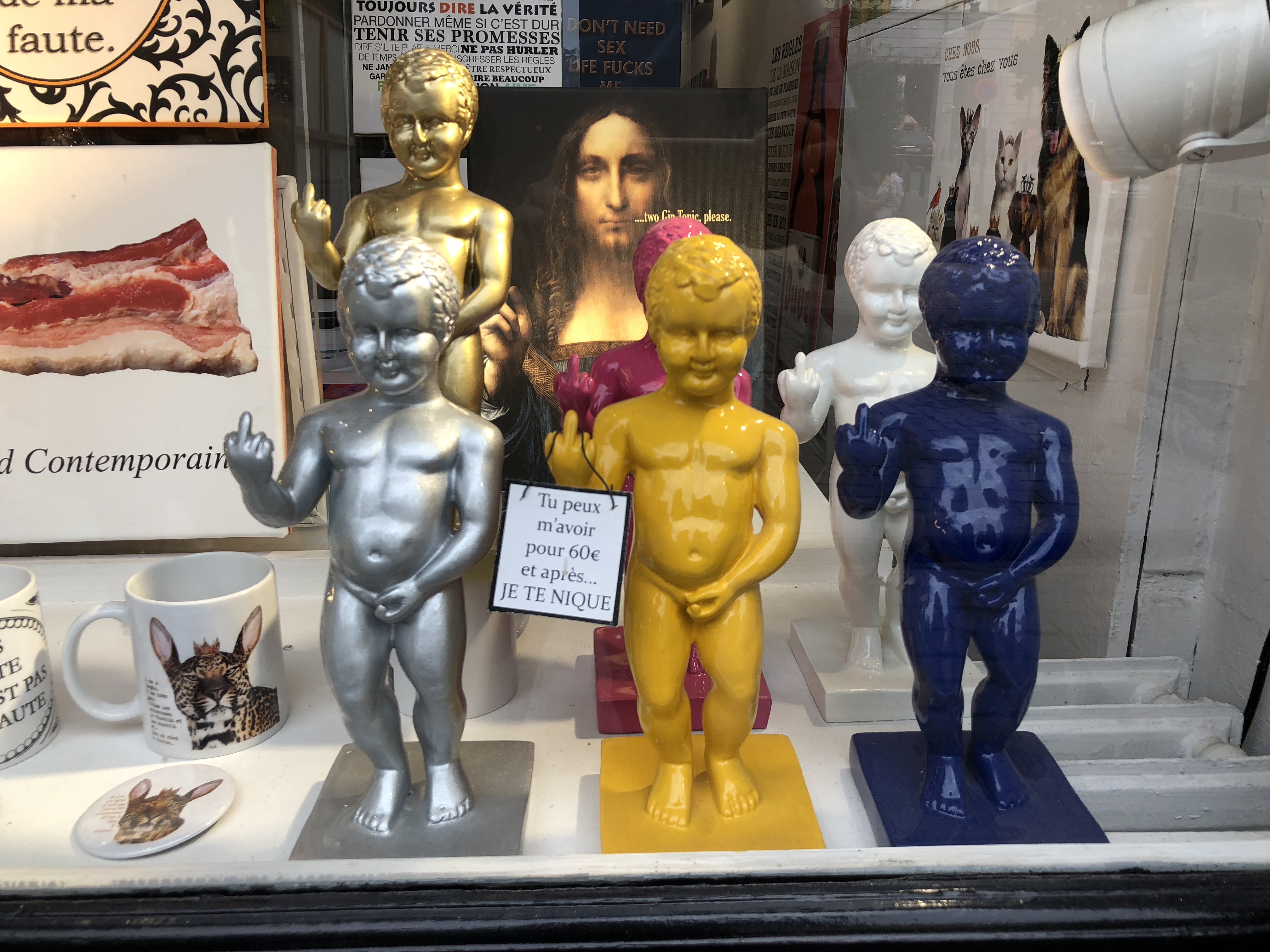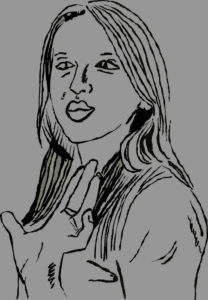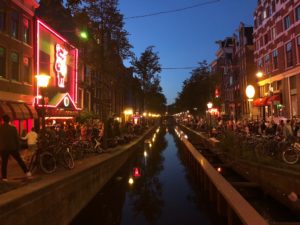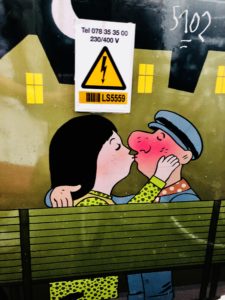2018.7.23
Day 23: Leuven, a city tour on a scorching hot day
2018.7.24
Day 24: Brussels, Manneken Pis sculpture of naked little boy urinating, EU, Foot massage and the plight of a Tibetan woman
2018.7.25
Day 25: Ghent, Jan van Eyck’s Lamb God, Gravensteen castle, Flemish dinner with the locals—a flowing conversation at night
2018.7.26
Day 26:Conclusion and reflection as an Asian girl who stayed in europe for a month
2018.7.23
Day 23: Leuven, a city tour on a scorching hot day
I am so tired! My body wants to melt down whenever I walk under the sun.
Today we took an early train to Leuven, home to the Catholic University of Leuven, the largest and oldest university of the Low Countries. Also a place where AC does not exist during the scorching summer. I couldn’t even keep up with the walking pace of our group. I just lagged behind and dragged my foot with fits of pain in my abdomen. Maybe the solo trip to Luxembourg was too much after all. I walked around with my heavy backpack for two whole days without rest. Last night I even went to a gay bar to watch drag queen show with one of my girl friends. Because I know I won’t have the opportunity to see drag queens in person and get a better understanding of the community elsewhere. I must go! I’ll leave the details of the experience in a future article.
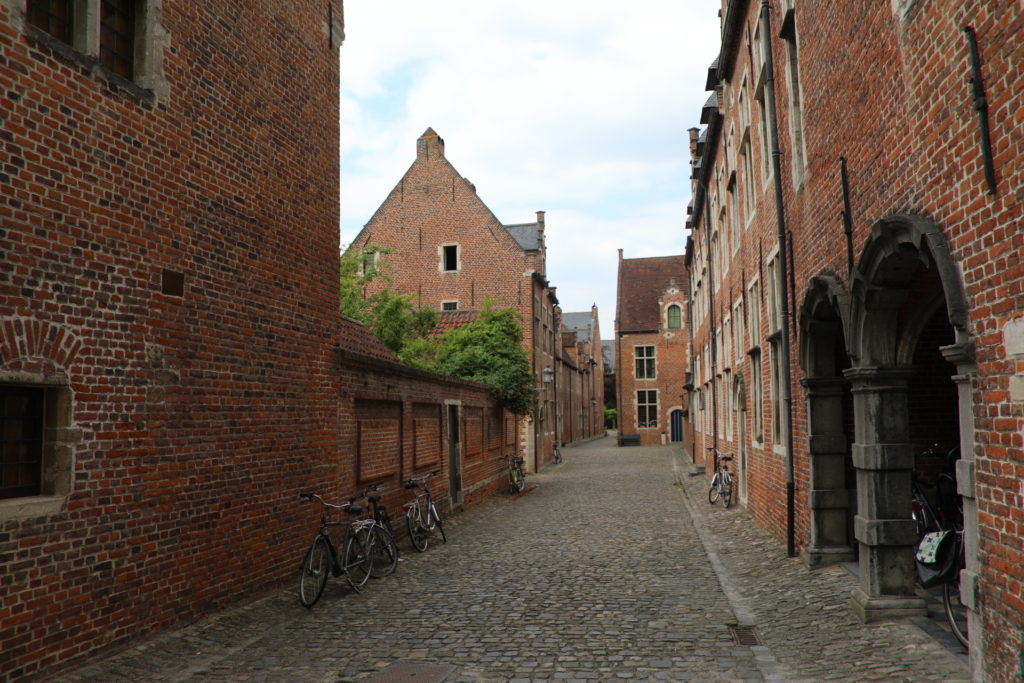
I have to say, because of the sheer exhaustion, it is very hard to keep an observant eye to everything around me. Despite of my constant curiosity, I couldn’t help but become more and more focused on the sensations of my own body, instead of the external environment.
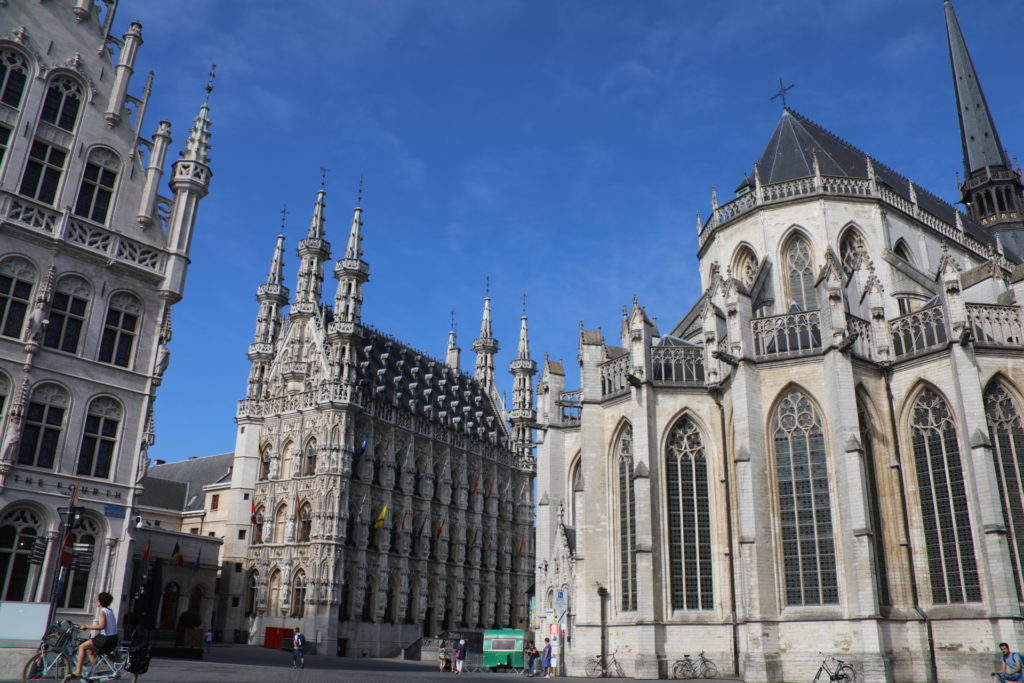
Leuven was a small city with quite empty streets, since students are all gone in the summer. The most extravagant building is city hall, which was built in a Gothic style in the 15th century and later exaggerated in the 19th century. Statues in canopied niches are all over the façade and sides of the building. The statues themselves dated from after 1850, representing patron saints, counts, dukes, and other personages of importance in the local history of the city.
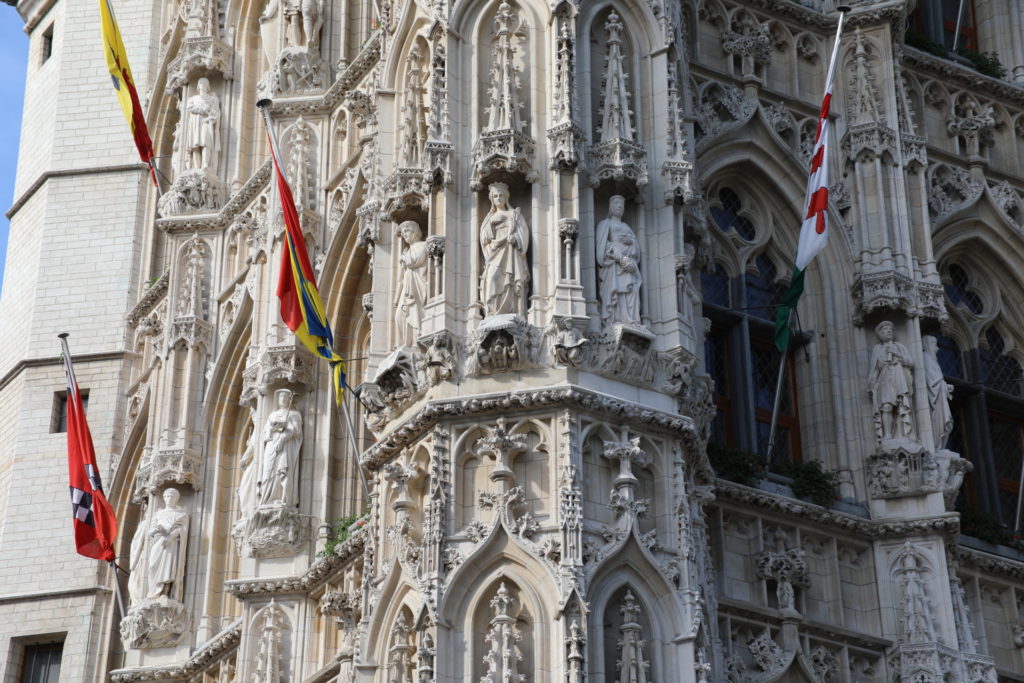
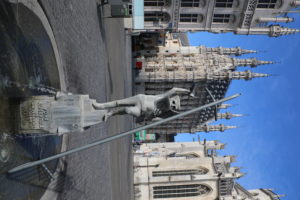
Leuven is also the beer capital of Flemish Brabant. It is home to the largest brewing company in the world — Stella Artois. It claims to have “the longest bar streets in the world” — a square surrounded by a full circle of bars. But I’m not a beer connoisseur. So I didn’t even bother to taste the savor of the local beer during our squeezed lunch time.
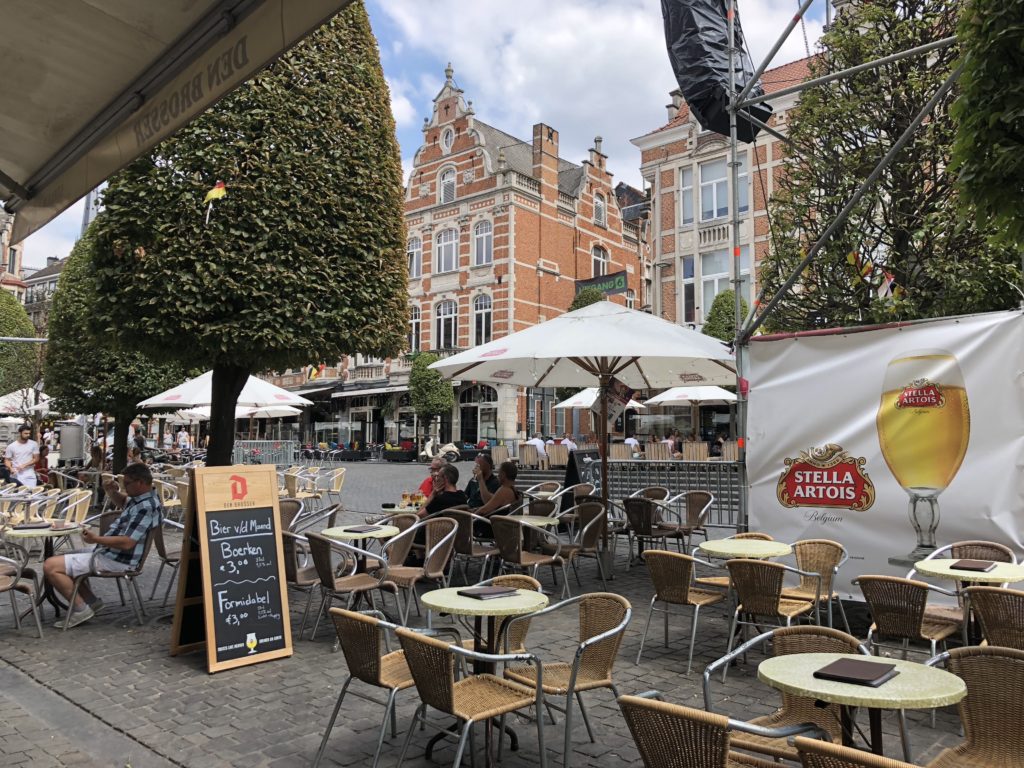
We walked for more than two hours in the afternoon, visiting modern colleges (which means residential units in Europe) and other historical landmarks. Despite of the historical and conservative atmosphere, the young students in Leuven are just as wild as those from any other part of the world. According to our tour guides, there used to be a historically important statue of a woman lying down. The young men, especially frat guys, would do nasty things to the statue. Eventually the statue had to be relocated. The other less “seductive” statues, such as birds, are also often destructed by the male students living in colleges.
At the end of the tour, they went to climb the tower of the university library. I simply couldn’t lift my legs anymore. Lying on the narrow and uncomfortably wooden bench outside of the library, I fell asleep and napped for almost an hour. I didn’t even care a little bit about the people passing by. I really wish to regain my energy and turn back into the ardent observer again… But I’m just so very tired!
2018.7.24
Day 24: Brussels, Manneken Pis sculpture of naked little boy urinating, EU, Foot massage and the plight of a Tibetan woman
We spent the day in Brussels, the capital of Belgium. It is a part of both the French community and the Flemish community of Belgium, but is separate from Flanders and Wallonia. It is also a principal center for international politics and the de facto capital of the European Union, as it hosts many EU institutions.
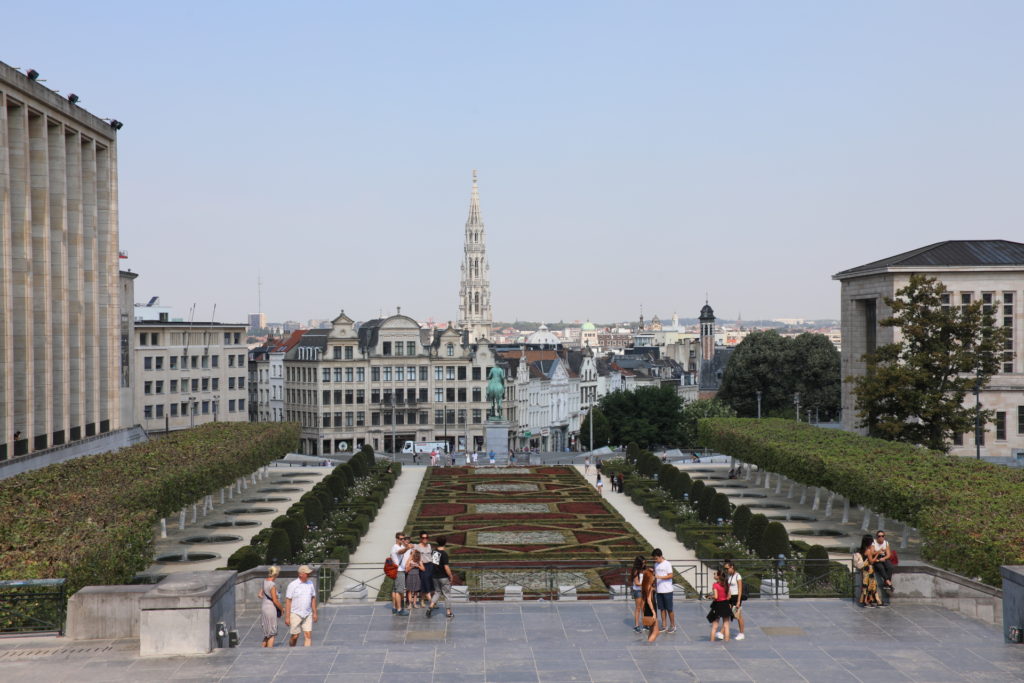
After staying at Antwerp for more than a week, I had different expectations for the capital city of Belgium. I expected it to be a bustling city with much more traffic, noises, and air conditioners. But it really is not too different from the other cities in Belgium. Here the construction machines in front of the Royal Palace and passing vehicles stirred up a wind of dust. There a few locals stood outside of the empty restaurants and daydreamed under the sun. The touristy places, such as the Grand Place are full of tourists under bright-colored umbrellas.
But one amazing thing about Brussels is its humor! If you walk down the streets and look up, you will realize that the comic strip heroes take possession of the walls and gables in almost every corner. The most famous one is perhaps Tintin, his dog Snowy and his friend Captain Haddock on the wall of rue de I’Etuve. I only had one comic book of Tintin when I was little. But I loved reading the adventure of the ace reporter and the foul-mouthed whisky lover. Engaged by Hergé’s sense of suspense and humor, I read the book for no less than five times.
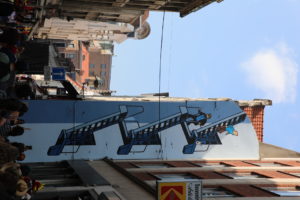
Rue de I’Etuve is also home to the famous Manneken Pis sculpture. It’s a landmark small bronze sculpture that depicts a naked little boy peeing into the fountain’s basin. It was designed in the 1610s. The statue embodies the sense of humor unique to the people of Brussels, as well as their characters of independence and individual freedom. Manneken Pis is dressed in different costumes on festivals. His wardrobe counts more than 900 distinct costumes.\
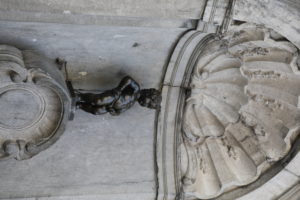
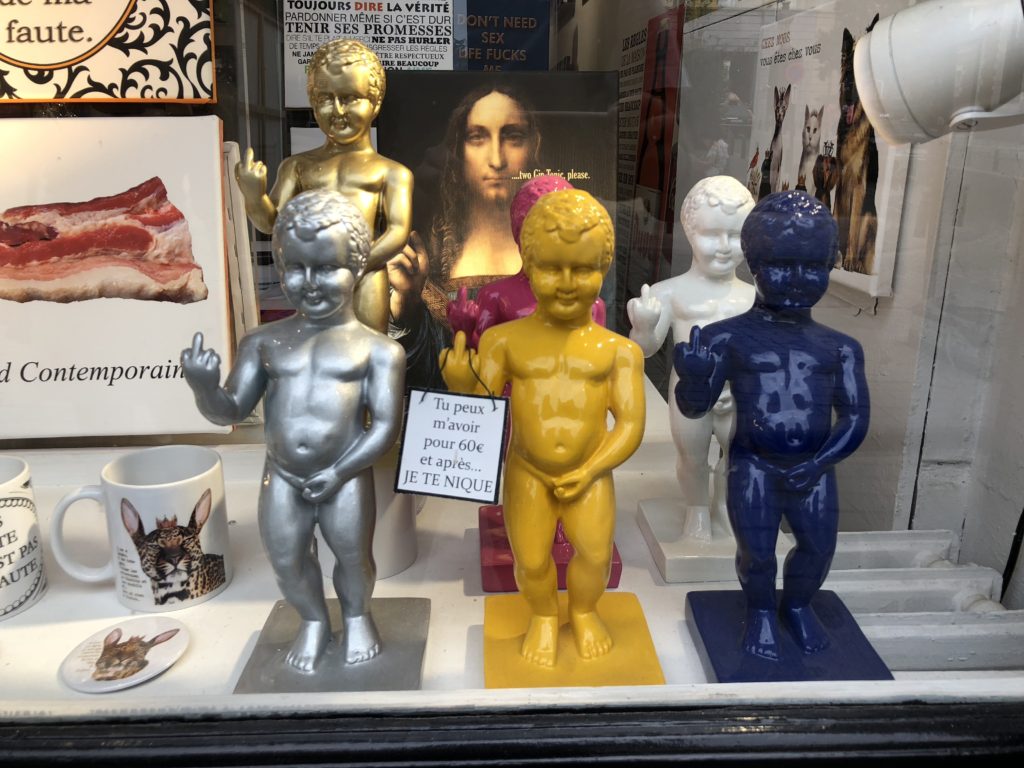
By the way, definitely try the chocolate ice cream in Brussels.
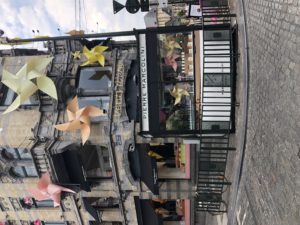
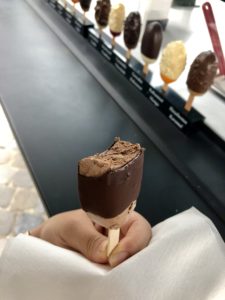
In the afternoon, we visited the European Parliament and the Parlamentarium, the new visitor center. The European Parliament is the directly elected parliamentary institution of the EU, composed of 751 members representing their own states.
To be honest, I’m not a fan of politics. It seems all based on the idea of power and profits. Originally, it could be seen as a device for France to connect with and refrain Germany as to eliminate the possibility of a war between them. Now, the EU is increasingly becoming a technocracy dominated by Germany. However, it is also without doubt that EU is in some aspects beneficial for Europe. Besides promoting peace and cooperation, it used to strength Europe’s economic power and helps human rights—every nation that wants to join has to sign up to the European Convention on human rights. Yet now it is uncertain to which direction EU is leading its nation members. The Euro is causing serious economic problems, while the political systems in many nations are fragmenting with high proportions of the populations voting for anti-EU parties.
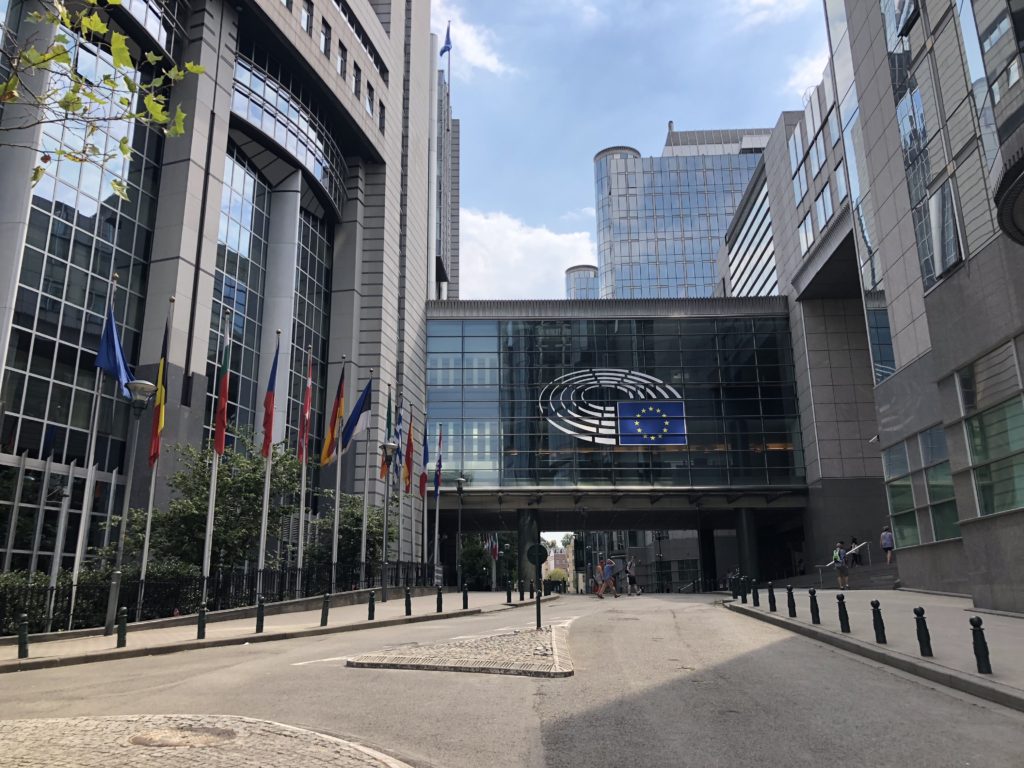
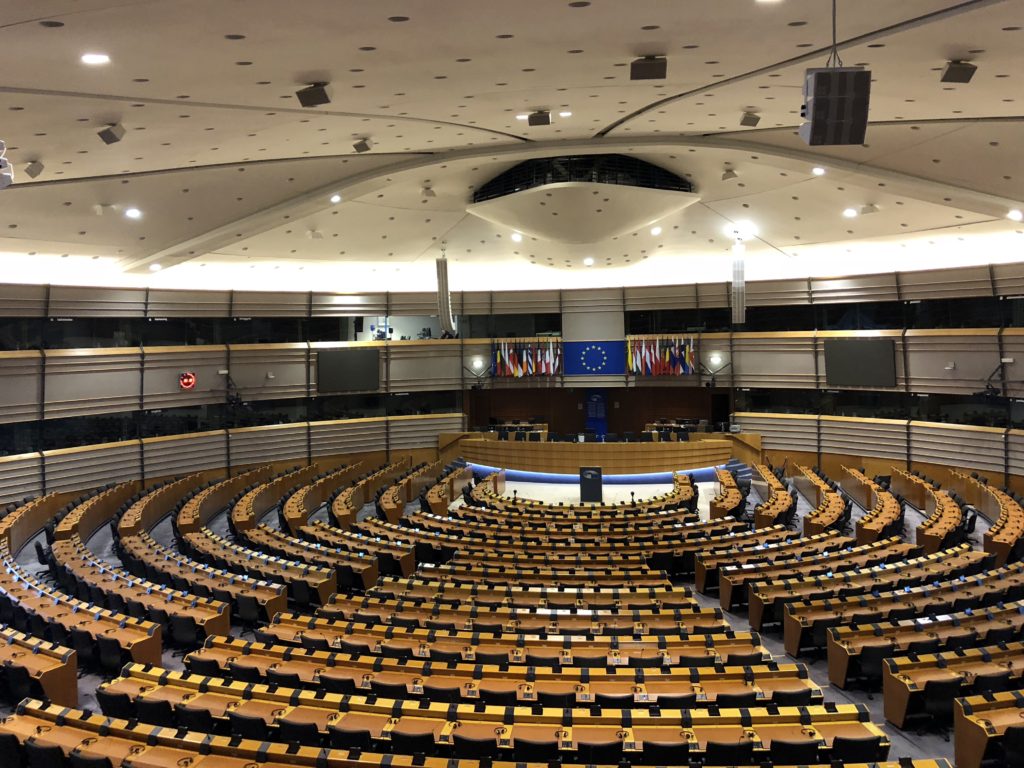
During the visit to these EU-related sites, everyone kept bragging about the benefit and necessity of EU and the great deeds EU has performed for the Europeans. Everything was discussed with a halo of glory, which seemed to me quite difficult to fully accept.
The halo was dispersed as soon as we walked out of the parliament area. My friend and I went to get Tibetan foot massage. The two middle-aged masseuses were very quiet during the massage. However, after the massage, one of the woman started asking us where we’re from. After telling her, we also asked the same question to her. She said that she is from Tibet and asked us if we knew Tibet. We said of course. Then she suddenly opened up to us. She told us in broken English that she came to Brussels when she was young. But her family and friends all live in Tibet. The Belgian government does not grant visa for them to come and stay here. “I don’t see them.” She said with a thick Tibetan accent.
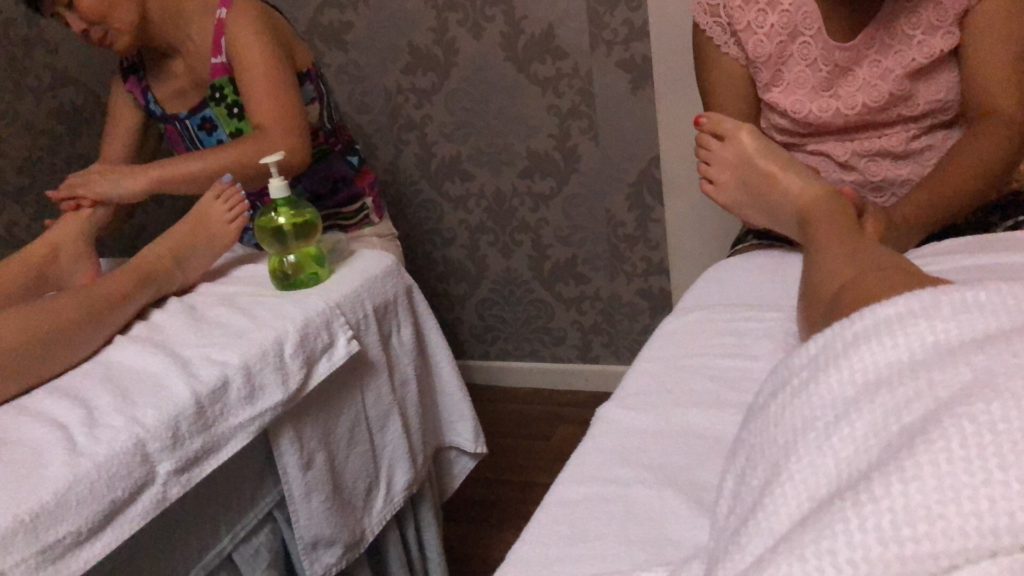
When we left a few minutes later, she even apologized for having talked to us that much. She gave us a lonely smile and said goodbye.
2018.7.25
Day 25: Ghent, Jan van Eyck’s Lamb God, Gravensteen Castle, Flemish dinner with the locals—a flowing conversation at night
Ghent is a small city with both medieval frivolity and the industrial edge. It was a great cloth town that grew to become the largest city after Paris and Constantinople in the medieval Europe. However, the hard-fought civil liberties of Ghent citizens were lost after they enraged the Ghent-born Holy Roman Emperor Charles V. He abolished the town’s privileges and humiliated the guildsmen by making them walk around town wearing nooses around necks.
Luckily, in the early 19th century, Ghent again became the first town in Flanders to undergo the Industrial Revolution. Nowadays, it has become the largest university town in Flanders. Many old buildings and docks are being renovated, as can be seen everywhere on the streets. The canalside medieval architecture mixed contrastingly with the renovated modern buildings and blatant construction sites.
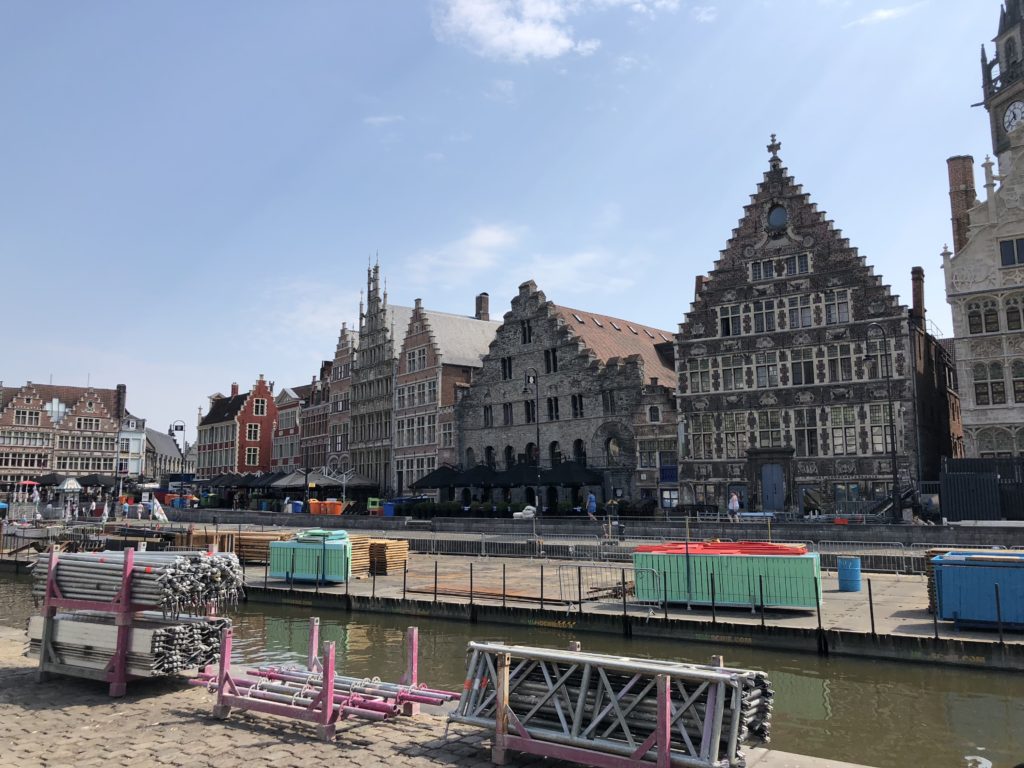
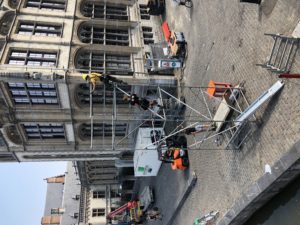
It was a very hot day, so it was almost impossible for me to keep up with the group and pay full attention to the tour guide — the former history professor of our professor’s! I only caught fragments of his speech. For example, when we stopped in front of a lake, the retired professor said that he nicknamed this lake “the Lovers’ Lake.” Because every time he came here, there was a couple hanging out together along the bank. Of course there was a couple when we were there as well. They were practicing with blue and yellow ribbons. On the cobbled ground nearby, I spotted a little red paper heart sticking to the ground.
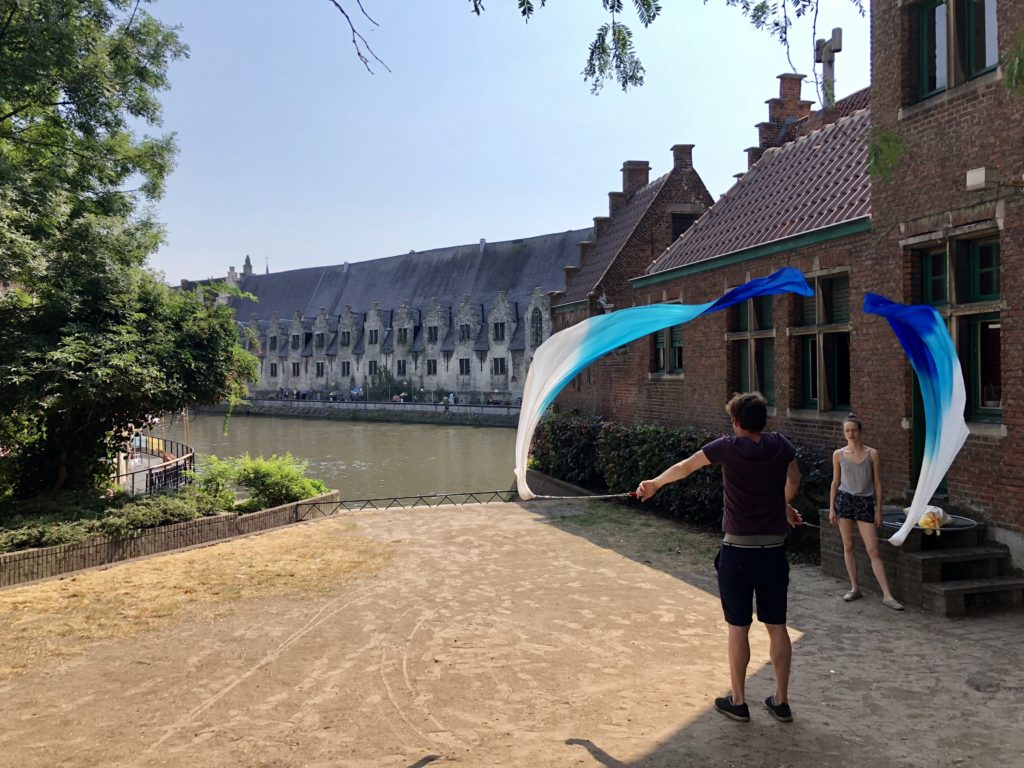
The tour ended soon after that. Later, our professor told us that the old man was a retired professor who really appreciated and cherished the opportunity to act as our city tour guide. He really missed his job and sent an email to our professor every year about the importance of the guiding opportunity to him. He was a great tour guide that led us into the shades and told us interesting historic stories. But I was so exhausted that I simply couldn’t pay much attention to most of his words. I felt a deep regret after hearing about his dedication and enthusiasm to his job and the education of young students. If I had known how important this was to him, I would listen with appreciation no matter how sore and painful my body was!
After the tour, we went to the St. Bavo Cathedral, where Jan van Eyck’s The adoration of the Mystic Lamb is located in a special temperature-controlled, half-darkened room. Everything on the painting — the clothes and jewels, the fountain, the natural landscape and churches in the distant background — is all painted with remarkable details. One of the panels got stolen and is still missing today, which has produced many mysteric theories. Albert Camus in his story imagines that it is kept by the protagonist, Clamence, in his apartment in Amsterdam.
We also went to Gravensteen, the counts of Flanders’ 12th century stone castle with moat, turrets and arrow slits. Inside there were some exhibitions of odd armor suits, a guillotine and torture devices. I sat by myself on top of the castle for a while and enjoyed a sliced view of the city of Ghent.
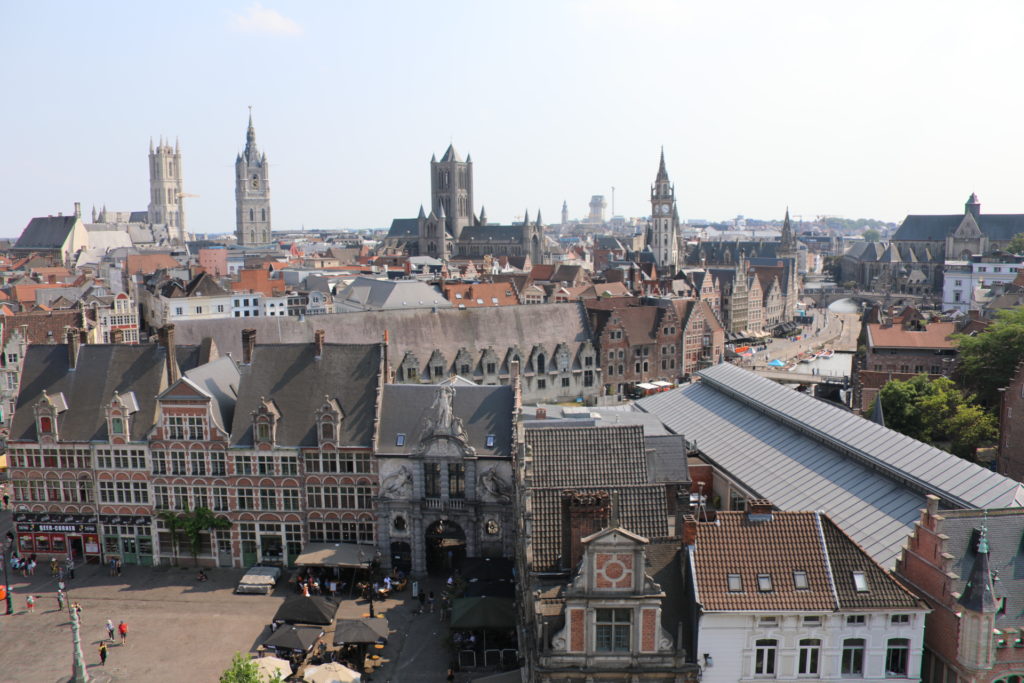
At night, we were divided in small groups and picked up by our guest families to go to their home for a typical Flemish dinner. This is absolutely one of the highlights of my trip. I was assigned to be with one of my best friends here, another Chinese girl, and our professor. We went to the house of Ivo, the director of the Flemish culture organization that hosted us for dinner.
Upon entering the house, we met his wife and granddaughter, Julie. Both he and his wife were almost 80 years old. His wife was very quiet, so I didn’t get to know her name well. But she was a very elegant lady in a bright yellow dress. When we were chatting around a small table on the corner of their big backyard, the wife was in the kitchen preparing for snacks and white wine. The backyard was quiet and spacious. The trees lining the walls blocked the view of other buildings, so that it almost felt like we were in the middle of nowhere while, in fact, the house is right by the city center. The old man poured us wine and we talked for about an hour. I learned that Julie, their granddaughter, was the national gymnastic champion in Belgium. She quitted a few years ago because she wanted to focus on her study in psychology. When she graduates from university, she wants to become a sports psychologist.
Later, we moved to the dinner table. Julie told us that her grandma was busy all day preparing for the dinner. The starter was a cold dish with little shrimps inside a hollowed tomato. The main course was steamed chicken breast served with red wine. And the dessert was a homemade blueberry pudding cake. After the dessert, we were provided with green tea or coffee, Belgian chocolate, a local sweet called “noses,” and little cupcakes.
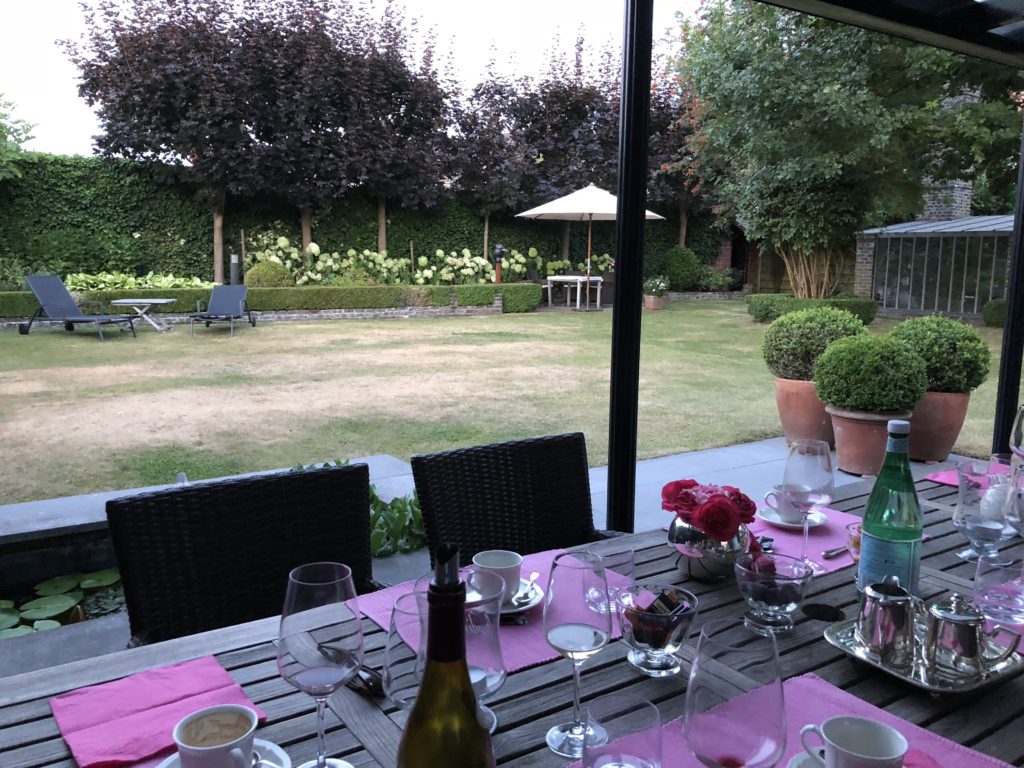
The conversation lasted for almost five hours without interruption. It flowed spontaneously to all directions. We talked about the cultural differences between China, America, and countries in Europe. The man told us an interesting incident of him being hung on the tree branch after the ladder slipped and how his neighbor climbed the wall to save him. He talked about his travel experiences around the world and the future travel plans to Lebanon and other countries. He also expressed his concern about the future of the Flemish culture organization that he is part of. The members were getting older, while the invited new blood didn’t seem interested and faded away after a few monthly meetings. It could be seen that he was very passionate about the preservation of local Flemish culture. “Symbols are important, as it promotes shared values in the society.” He said. The cutest moment was when we told him how lucky he was to have met and married his wife, he raised his hand and giggled — “Well, I confirm!” He said happily.
When we had to say goodbye in the end, they hugged me tightly and kissed me on both cheeks for three times. I was never too close with my grandparents, so I was touched by their amiability and cordiality to us. But I must remember that they can only represent the highly-educated, knowledgeable and rich Europeans. Certainly not all people here are like that. For instance, after returning to the hostel, one of my roommates told me how her host, a male professor, made her serve the desserts to him and the other male student.
The last of our excursion day thus ended. The final exam and video presentation await us two days later.
2018.7.26
Day 26: Conclusion and reflection as an Asian girl who stayed in Europe for a month
It is interesting to reflect upon how my perspectives on these two countries have changed throughout the trip. Before coming here, my mind was full of fantasies about the romantic atmosphere, the picturesque natural landscape and exquisitely constructed medieval architecture. I was constantly daydreaming about running away from the daily trifles and moving into an European city in the future to start a new, romantic life.
It was not until I stayed in Europe for a month that I realized that it is by no means the ideal place that I had in mind for myself. Despite of its eager effort to recover, or even re-exaggerate the past, it seems to me that what is gone is gone and the glorious past in this continent cannot be retrieved by artificial means. For me, the cities are either too empty or too touristy to stay at for a long time. I was so accustomed to the busy life in vibrant cities that I’m not used to the quiet nights at all. But I was also a bit overwhelmed by the crowd of tourists who flushed into the city during the day and threw their amazed looks and camera flashes at the medieval buildings.
As a foreigner, particularly as an Asian woman, I felt like the locals were quite sensitive toward my distinct racial and gender identity. When I went shopping in local stores or eating out in local restaurants, people sometimes talked to us in a rude and condescending manner. While I was walking on the streets, it happened at least four times that some local young men started yelling random Japanese words and obscenities at me. I also became more self-conscious toward my own differences from people around me, both physically and mentally. After all, I was so used to the racial and cultural diversity in the bay area, that it is hard for me to stay for long in a place where so few Asians are present.
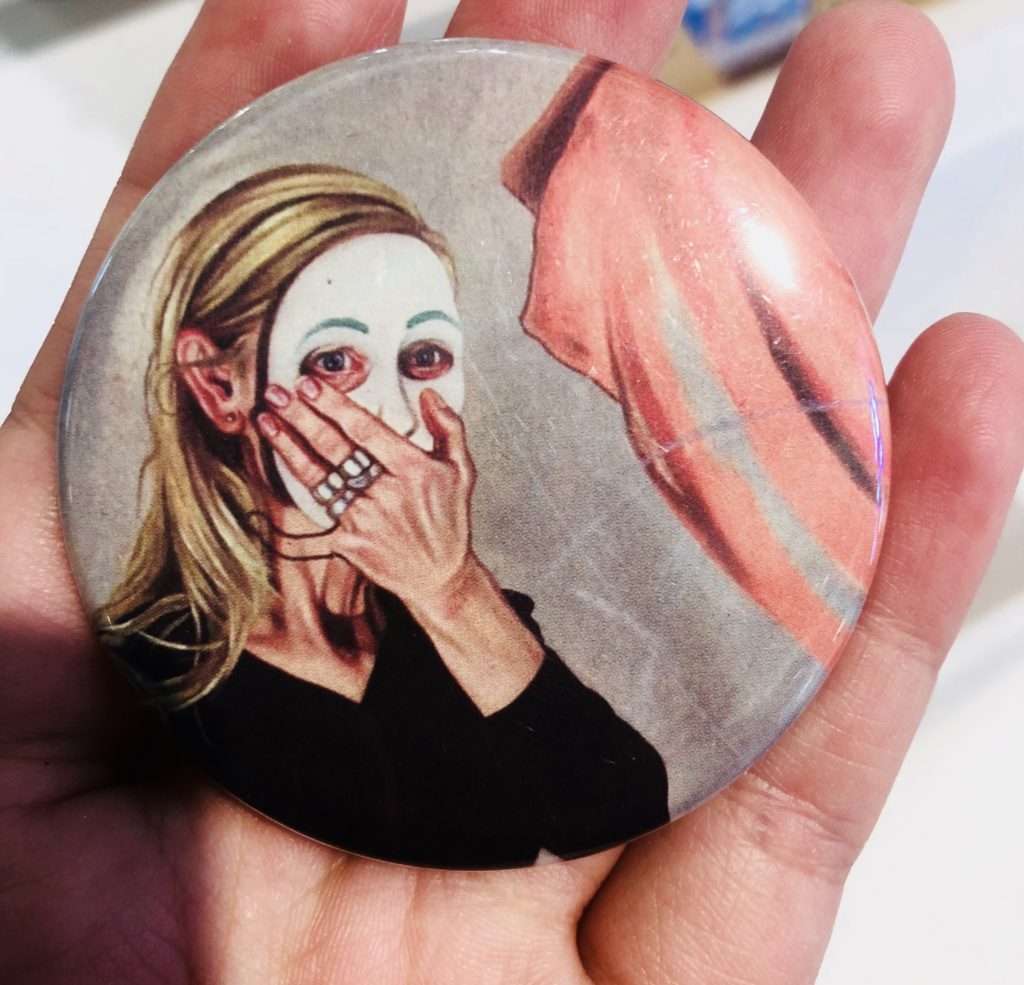
But what I admire most of Europe is its liberal-mindedness. In the Netherlands specifically, the government has open-minded and flexible policies toward controversial issues such as soft drugs, abortions, prostitutions, euthanasia, homosexual marriage, etc. There are certainly pros and cons about these policies. But I think it is very crucial that the government recognizes these issues and takes a liberal and open-minded stance toward them, unlike the central power in some other places. I went to a gay bar and watched a drag queen show in Antwerp. And I remembered seeing and being touched greatly by the gaiety of these gay people. Those are the smiles that some of my fellow citizens in China are wishing for all of their lives. But it is almost impossible for them to be acknowledged and accepted by the official government. How sad!
This is only a very short and incomplete conclusion, as I’m running out of time. I plan to write several new articles when I get back to China. They will be about different topics, such as lovers on the road, or how the Red Light District has completely changed my views on sex and prostitution. I must say that it is one of the most rewarding trips I’ve taken so far, and I’m very grateful for meeting such an interesting group of people here. There is so much to write about, so I’ll just take my time with it.
